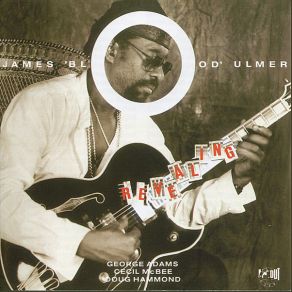Revealing
Download links and information about Revealing by James Blood Ulmer, Doug Hammond, George Adams, Cecil McBee. This album was released in 1977 and it belongs to Jazz, Avant Garde Jazz genres. It contains 4 tracks with total duration of 36:26 minutes.

|
|
|---|---|
| Artist: | James Blood Ulmer, Doug Hammond, George Adams, Cecil McBee |
| Release date: | 1977 |
| Genre: | Jazz, Avant Garde Jazz |
| Tracks: | 4 |
| Duration: | 36:26 |
| Buy it NOW at: | |
| Buy on iTunes $9.99 | |
| Buy on Amazon $7.99 | |
| Buy on iTunes $10.99 | |
Tracks
[Edit]| No. | Title | Length |
|---|---|---|
| 1. | Revealing | 8:19 |
| 2. | Raw Groove | 8:54 |
| 3. | Overtime | 9:08 |
| 4. | Love Nest | 10:05 |
Details
[Edit]Revealing, by James Blood Ulmer, was the album he issued in Europe in 1977, a full year before his breakout disc, Tales From Captain Black with Ornette Coleman in 1978. Not to fear, however, with the slight difference of his guitar tone, all of the harmolodic concepts are in place and most of them are exercised here. With a quartet featuring the late George Adams on tenor, Cecil McBee on bass, and Doug Hammond on drums, Blood displays why he is easily the most original jazz guitarist of his generation. It's true that Sonny Sharrock may have been further out, but he wasn't as versatile — Blood could play even then not only like a guitarist, though unlike any you ever heard before him — he could also play like a bass player, a saxophonist, and a guitar player. Over the four extended pieces here — and in particular, "Overtime" — Blood employs what Coleman's influence made possible: that a guitar whose strings were all tuned to one note (harmolodic E) was capable of playing all the pitches at one time. Therefore, he could solo while playing chords and drones at the same time and leave plenty of room for others in the mix as well. The interplay between Adams and Blood on "Overtime" is astonishing. The melodic line breaks after every round as each man capitalizes on the other's ideas and extends the melody one bar into the frame of the improvisation. Blood had yet to show his hand when it came to his funk leanings (gained just a few years before jamming with George Clinton and Bernie Worrell in Detroit, as well as Black Nasty, and then John Patton), but they aren't far beneath the surface. There's the cut and jump key changes and the percussive down-hand evident on all of his later recordings. Revealing is more than just fascinating listening to hear the development in Blood Ulmer's playing and compositional ideas, it's a solid jazz date with visionary players taking a new turn with the music and seeing how fast they can drive it down the road. While it does not contain the sheer drama of Tales From Captain Black or Are You Glad to Be in America because it's a fairly laid-back date, it does contain all of their musical qualities.